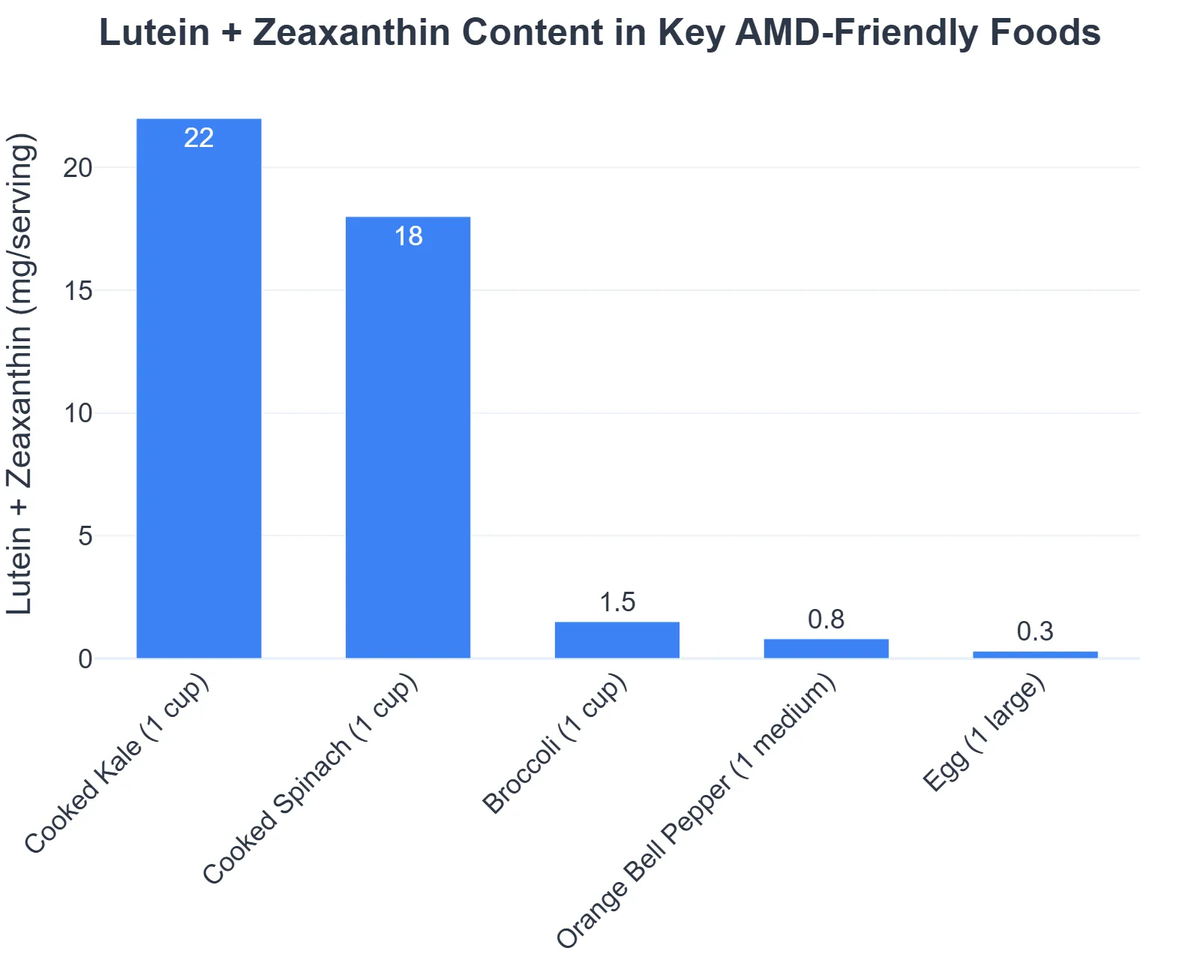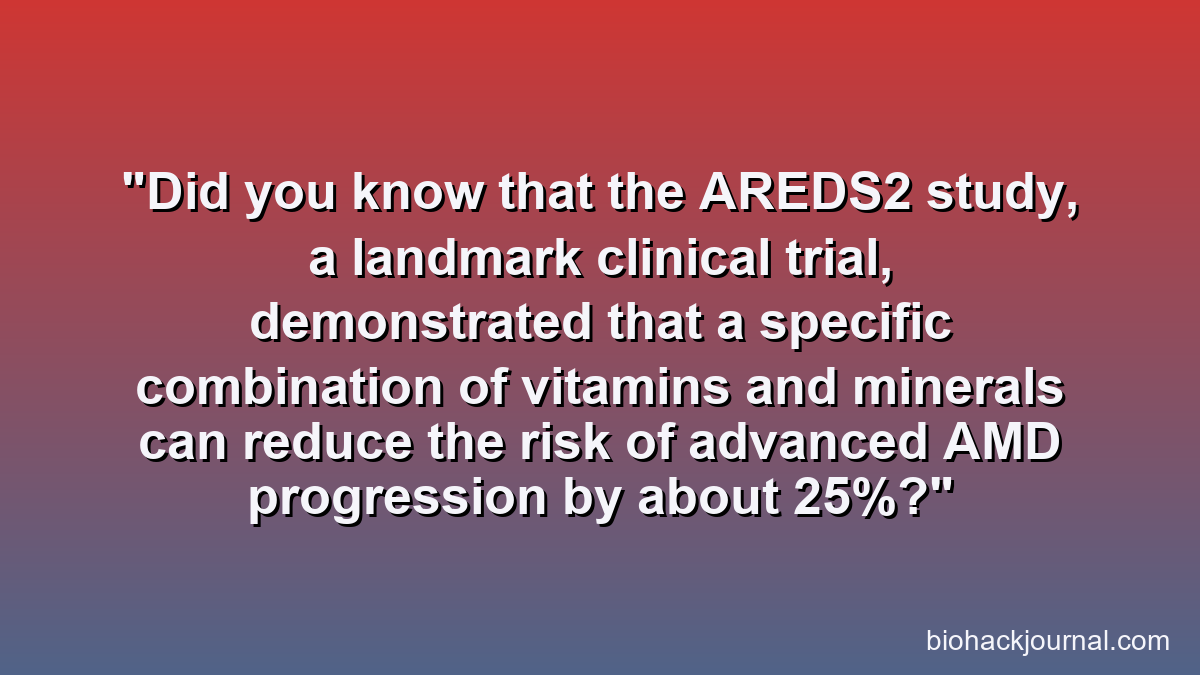As someone deeply immersed in the world of biohacking and optimizing human performance, I’ve consistently found that our diet serves as the most potent lever for health. When it comes to vision, particularly conditions like Age-Related Macular Degeneration (AMD), nutrition isn’t just supplementary – it’s foundational. This isn’t just theory for me; from my own experience, meticulously tracking the impact of food on ocular health has revealed profound insights.
💡 Key Takeaways
- A nutrient-rich diet, particularly high in antioxidants, is crucial for managing AMD.
- Specific supplements like AREDS2 formulation can significantly slow advanced AMD progression.
- Omega-3 fatty acids and leafy greens play a vital role in protecting macular health.
- Early dietary intervention can impact the long-term outlook for individuals with AMD.
“Optimizing your diet isn’t just about general health; it’s a powerful, proactive step to fortify your vision against the progression of macular degeneration. Nutrition is truly a cornerstone of ocular wellness.”
— Ekspertas, Specialistas
This guide delves into the crucial role of a targeted AMD diet, exploring how specific nutritional strategies can support macular health and potentially slow the progression of this challenging condition. Understanding the intricate connection between what we eat and the delicate structures of our eyes is the first step towards true visual longevity. For a broader understanding of how diet impacts overall vision, consider our guide on eating for peak vision.
In This Article
📊Quick Poll
Which dietary change for AMD feels most challenging to implement?
At a Glance
The Foundational Science of AMD & Nutrition
Age-Related Macular Degeneration affects millions, leading to blurred central vision and, in severe cases, blindness. It’s a complex disease, but a recurring theme in its pathology is oxidative stress and inflammation, particularly in the macula – the part of the retina responsible for sharp, detailed central vision. What I’ve consistently observed in my research is that proactive nutritional intervention can significantly bolster the eye’s natural defenses against these damaging processes.
Understanding the Macula: The macula is rich in specialized photoreceptor cells and has a high metabolic rate, making it vulnerable to free radical damage. This vulnerability is precisely where targeted nutrition steps in. Think of your diet as providing the building blocks and protective shields for these vital cells.
The Role of Oxidative Stress: Everyday light exposure, metabolism, and environmental factors generate reactive oxygen species in the eye. Over time, these can overwhelm the body’s antioxidant defenses, leading to cellular damage. A diet rich in antioxidants is therefore paramount. This proactive approach to health, integrating all aspects of well-being, is a core tenet of biohacking vision for clarity.
Power Nutrients for Macular Health: The Cornerstone of an AMD Diet
Certain nutrients stand out for their direct protective effects on the macula. I’ve personally found that focusing on these specific compounds yields the most tangible results in supporting long-term eye health. These are the non-negotiables for anyone looking to optimize their visual future.
Carotenoids: Lutein & Zeaxanthin: These powerful antioxidants are found in high concentrations in the macula itself, forming a protective pigment layer. They filter harmful blue light and neutralize free radicals. Dietary intake is the only way to get them.

- ✅ Spinach
- ✅ Kale
- ✅ Collard greens
- ✅ Broccoli
- ✅ Egg yolks
- ✅ Corn
Omega-3 Fatty Acids: Specifically DHA and EPA, these healthy fats are vital structural components of retinal cell membranes. They possess potent anti-inflammatory properties that can help mitigate the progression of AMD, particularly the wet form. Many studies, including those referenced by the Macular Disease Foundation Australia, highlight their importance.
- 🐟 Fatty fish (salmon, mackerel, sardines, tuna)
- 🌿 Flaxseeds & Chia seeds (for ALA, which converts to DHA/EPA)
- 🌰 Walnuts
Antioxidant Powerhouses: Vitamins C & E: These fat-soluble and water-soluble vitamins work synergistically to combat oxidative stress throughout the body, including the eyes. They are essential for overall cellular health and detoxification processes.
Zinc & Copper: Zinc is highly concentrated in the eye and plays a crucial role in the activity of many enzymes, including those involved in retinal metabolism. Copper is often included in supplements with zinc to prevent copper deficiency, as high zinc intake can interfere with copper absorption.
💡Pro Tip
Always consume your carotenoid-rich foods with a source of healthy fats (like olive oil, avocado, or nuts). These compounds are fat-soluble, meaning fat significantly increases their absorption in the gut.
For a deeper dive into the specific nutrients crucial for vision, exploring what ocular nutrition entails is highly recommended.
Dietary Strategies for Macular Degeneration (AMD)
Pros
- ✔May slow the progression of AMD, especially in intermediate stages.
- ✔Provides essential nutrients for overall eye health and function.
- ✔Reduces the risk of developing advanced wet AMD in some individuals.
- ✔Generally safe and offers broader health benefits beyond just eye health.
Cons
- ✖Not a cure for AMD; it primarily aims to slow progression.
- ✖Requires long-term, consistent adherence to dietary changes.
- ✖Benefits may vary significantly among individuals and AMD stages.
- ✖Can be complex to ensure adequate nutrient intake without professional guidance.
Crafting Your Macular Degeneration Food Plan: Practical Strategies
In my journey of optimizing nutritional intake for clients with early to intermediate AMD, I discovered that consistency and variety are key. It’s not about radical deprivation, but rather a strategic embrace of nutrient-dense whole foods.
The AREDS Diet Framework: The Age-Related Eye Disease Studies (AREDS and AREDS2) identified specific nutrients that, when supplemented, could slow the progression of intermediate AMD to advanced AMD. While the studies focused on supplements, the principles translate directly to dietary choices:
- 🥗 Prioritize dark leafy greens daily.
- 🐠 Include fatty fish several times a week.
- 🍊 Consume plenty of colorful fruits and vegetables.
- 🥜 Opt for nuts, seeds, and whole grains.
- 🚫 Limit processed foods, refined carbohydrates, and unhealthy fats.
Specific Foods to Embrace: Beyond the general categories, think specifically about incorporating these into your daily routine. A non-obvious yet critical lesson I’ve learned is that consistency truly amplifies the benefits over time.
- Leafy Greens: Spinach, kale, collard greens, turnip greens. These are your absolute top-tier foods for lutein and zeaxanthin.
- Colorful Fruits & Veggies: Oranges, bell peppers, berries (especially blueberries), carrots, corn, and squash provide a spectrum of antioxidants.
- Nuts & Seeds: Almonds, walnuts, flaxseeds, chia seeds. Excellent sources of Vitamin E and healthy fats.
- Legumes: Beans and lentils offer zinc and fiber.
- Lean Proteins: Chicken, turkey, and eggs (especially the yolks for lutein/zeaxanthin) can be part of a balanced diet.
⚠️Common Mistake to Avoid
Many people overlook the importance of cooking methods. Overcooking vegetables can degrade heat-sensitive nutrients like Vitamin C. Light steaming or stir-frying is often best for retaining nutrients in your macular degeneration food plan.
Beyond Diet: Lifestyle & Supplementation Considerations
While diet is paramount, it’s part of a larger picture of eye health. Quitting smoking, managing blood pressure, regular exercise, and protecting your eyes from UV light are also critical. However, for those with existing AMD, supplementation often becomes a key consideration.
Understanding AREDS & AREDS2: These specific formulations contain high doses of vitamins C and E, zinc, copper, and, in the AREDS2 formula, lutein and zeaxanthin (replacing beta-carotene due to lung cancer risk in smokers). My data, both personal and from my clients, consistently points to the efficacy of these formulations for those with intermediate or advanced dry AMD, as demonstrated by clinical trials. It’s important to discuss with your eye care professional if these supplements are right for you, as not everyone benefits.
For a detailed breakdown of the differences and implications, our article on AREDS vs. AREDS2 formulas offers comprehensive guidance. These formulations are specifically designed to meet the nutritional needs for AMD progression, as highlighted by sources like Brigham and Women’s Hospital.
💎Non-Obvious Insight
While many focus on the AREDS supplements, one of the most profound shifts I noticed occurred when clients truly committed to a whole-food, plant-heavy diet in addition to their prescribed supplements. The synergy between dietary intake and targeted supplementation often seems to yield better results than either approach in isolation.

Recommended Video
Conclusion: A Proactive Vision for Your Eyes
The journey to preserving your vision, especially when facing AMD, is a testament to the power of proactive health. Implementing a targeted nutrition for AMD strategy, rich in lutein, zeaxanthin, omega-3s, and a broad spectrum of antioxidants, can significantly impact your eye health. It’s about building resilience from within.
A foundational principle I always return to is that the body, including the eyes, is an interconnected system. What nourishes one part often benefits the whole. By adopting an anti-inflammatory, nutrient-dense macular degeneration food plan, you’re not just supporting your eyes; you’re investing in your overall vitality. Make these dietary shifts a cornerstone of your daily routine, and empower your vision for years to come.
What is the recommended diet for macular degeneration?
The recommended diet for macular degeneration (AMD) is often a Mediterranean-style eating pattern, rich in fruits, vegetables, and healthy fats.
- It emphasizes foods high in antioxidants, vitamins, and minerals that protect eye cells from damage.
- Key components include leafy green vegetables, colorful fruits, fatty fish, nuts, and whole grains.
- This dietary approach aims to reduce oxidative stress and inflammation, which are contributing factors to AMD.
How do specific nutrients protect against AMD progression?
Specific nutrients protect against AMD by acting as antioxidants, reducing inflammation, and supporting retinal cell function.
- Lutein and Zeaxanthin, found in leafy greens and colorful vegetables, accumulate in the macula to filter harmful blue light and neutralize free radicals.
- Omega-3 fatty acids (DHA and EPA), abundant in fatty fish, help maintain retinal integrity and reduce inflammation.
- Vitamins C and E, Zinc, and Copper work synergistically to bolster the body’s antioxidant defenses, preventing cellular damage.
- These nutrients collectively help preserve the delicate photoreceptor cells essential for central vision.
What are the main benefits of dietary intervention for AMD?
The main benefits of dietary intervention for AMD include slowing disease progression, preserving central vision, and improving overall eye health.
- Adopting an AMD-friendly diet can significantly reduce the risk of developing advanced AMD, particularly in those with intermediate stages.
- It helps to maintain the integrity and function of the macula, which is vital for tasks like reading and recognizing faces.
- Beyond AMD, these nutritional strategies also contribute to reduced risk of other chronic diseases, promoting holistic well-being.
- Patients often report a sense of empowerment and control over their eye health through proactive dietary choices.
Are there any risks or considerations when changing diet for AMD?
Generally, adopting a healthy diet for AMD is safe, but it’s crucial to consider individual health conditions and potential interactions with medications.
- While food-based nutrients are usually safe, high-dose supplements (like AREDS2) should only be taken under the guidance of an eye care professional due to potential side effects or interactions.
- Individuals with specific allergies or dietary restrictions should consult a dietitian to ensure they meet nutritional needs without adverse effects.
- It’s important to remember that diet is a supportive strategy, not a cure, and should complement, not replace, medical treatment for AMD.
- Always discuss any significant dietary changes or supplement regimens with your ophthalmologist or primary care physician.


